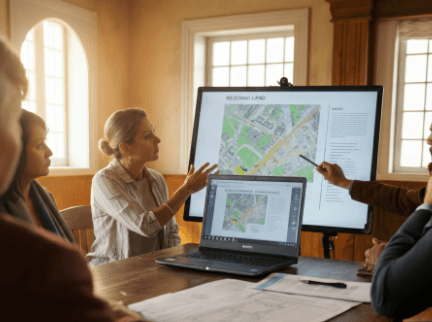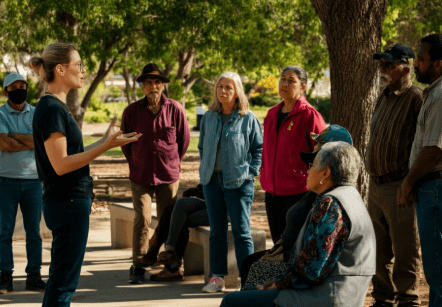Buying land for community development or affordable housing is a promising venture and a socially responsible strategy. For Florida residents, land buyers, property investors, real estate investors, land developers, housing advocates, and urban planners, understanding the nuances of buying land for community development or affordable housing can unlock substantial benefits. This blog will provide valuable insights, practical tips, and relevant examples to help you make informed decisions and foster positive community growth.
Steve Daria and Joleigh, experienced real estate investors, emphasize the importance of thorough research when buying land for community development or affordable housing. They suggest evaluating zoning regulations and community needs to ensure the land suits your project. Additionally, their advice includes negotiating terms that align with long-term sustainability goals.
Why Buy Land for Community Development or Affordable Housing?
Buying land for community development or affordable housing offers numerous advantages:
- First, there is a critical need for affordable living options to help alleviate housing shortages.
- Creating sustainable living environments contributes to communities’ overall well-being and growth.
- It presents lucrative and affordable housing solutions.
Understanding Community Development
Community development involves the collaborative efforts of citizens, organizations, and government entities to improve the quality of life in a community.
It encompasses various aspects, including housing, infrastructure, education, and healthcare.

Affordable Housing Defined
Affordable housing refers to affordable residential units for individuals or families with low to average incomes.
The goal is to give safe and decent housing options without overburdening residents with excessive costs.
Affordable housing initiatives often receive support from government programs, non-profit organizations, and private investors.
Benefits of Purchasing Land for Community Development or Affordable Housing
Investing in land for community development or affordable housing can lead to sustainable growth, improved quality of life, and economic revitalization of underserved areas.
Addressing Housing Shortages
One of the most significant benefits of investing in affordable housing is addressing housing shortages.
Many regions, including Florida, face a growing demand for affordable living options.
Investing in this sector helps bridge the gap between supply and demand, ensuring more people can access safe and affordable homes.
Positive Social Impact
Investing in community development or affordable housing has a positive social impact.
It creates stable living environments for individuals and families, reduces homelessness, and fosters stronger communities.
Additionally, it promotes economic growth by generating jobs and supporting local businesses.
Financial Returns
Contrary to common misconceptions, investing in affordable housing can yield attractive financial returns.
Government incentives, tax credits, and subsidies can enhance profitability.
The steady demand for affordable housing also ensures a consistent rental income, making it a viable long-term investment.
Get Started: Get Your Cash Offer Below…
We are direct land buyers. There are no commissions or fees and no obligation whatsoever. Start below by sharing where your property is and where we can send your offer…
Tips for Purchasing Land for Community Development or Affordable Housing
When purchasing land for community development or affordable housing, various factors must be considered to ensure a successful project.
1. Research Local Market Conditions
Before investing in land for community development or affordable housing, it is crucial to research local market conditions.
Knowing the demand for affordable housing in the area, analyze population growth trends, and evaluate the availability of important amenities such as schools, healthcare facilities, and transportation options.
2. Identify Potential Locations
Location is an important factor in the success of any real estate investment.
Identify potential locations that align with your investment goals.
Look for areas with a high demand for affordable housing, proximity to employment centers, and access to public transportation.
3. Evaluate Zoning and Regulations
Make yourself familiar with local land zoning and regulations governing land use.
Ensure the land you are considering is zoned for community development or affordable housing projects.
Understanding the regulatory framework will help you avoid legal hurdles and streamline development.
4. Collaborate with Stakeholders
Successful community development and affordable housing projects require collaboration with various stakeholders.
Engage with local government agencies, non-profit organizations, and community groups to gain support and access resources.
Building solid partnerships can facilitate project approvals, funding opportunities, and community acceptance.
5. Conduct Feasibility Studies
Supervising feasibility studies is essential to assessing the viability of your investment.
Evaluate land costs, construction expenses, potential rental income, and operating costs.
Feasibility studies provide valuable insights into the financial feasibility of your project and help you make informed investment decisions.
6. Secure Financing
Financing is crucial in investing in community development or affordable housing.
Explore financing options, including traditional bank loans, government grants, tax credits, and private investors.
Additionally, consider partnering with financial institutions specializing in affordable housing projects, as they may offer favorable terms and conditions.
7. Incorporate Sustainable Practices
Sustainability is a crucial consideration in modern community development and affordable housing projects.
Incorporate sustainable practices such as energy-efficient building materials, renewable energy sources, and water conservation measures.
Sustainable developments benefit the environment, reduce operational costs, and enhance the marketability of your project.
8. Engage the Community
Interacting with the community is vital for the success of your project.
Involve residents, local businesses, and community leaders in the planning and development process.
Conduct public consultations, gather feedback, and address concerns to build trust and gain community support.

9. Monitor and Evaluate Progress
Once your project is underway, it is essential to continuously monitor and evaluate its progress.
Regularly assess key performance indicators such as occupancy rates, rental income, and tenant satisfaction.
Monitoring progress allows you to know and address any problems promptly, ensuring the long-term success of your investment.
10. Stay Informed About Industry Trends
The real estate and community development industries are constantly evolving.
Stay up-to-date about the latest trends, market conditions, and regulatory changes by attending industry conferences, joining professional associations, and networking with other investors and industry experts.
Staying updated will help you adapt to changing market dynamics and make informed investment decisions.
11. Plan for Long-Term Maintenance
Long-term maintenance is crucial to the success and sustainability of community development or affordable housing projects.
Build a comprehensive maintenance plan that includes regular inspections, repairs, and upgrades.
Proper maintenance makes sure the longevity of your investment and enhances tenant satisfaction.
12. Promote Your Project
Promoting your community development or affordable housing project is essential to attract tenants and investors.
Utilize different marketing channels, including social media, online listings, and local advertising.
Highlight your project’s unique features and benefits, such as affordable rents, convenient location, and modern amenities.
Conclusion
Buying land for community development or affordable housing is meaningful and rewarding. You can build more robust, resilient communities by addressing housing shortages, creating positive social impact, and achieving financial returns.
Remember to research local market conditions, identify potential locations, evaluate zoning regulations, collaborate with stakeholders, conduct feasibility studies, secure financing, incorporate sustainable practices, and engage the community.
**NOTICE: Please note that the content presented in this post is intended solely for informational and educational purposes. It should not be construed as legal or financial advice or relied upon as a replacement for consultation with a qualified attorney or CPA. For specific guidance on legal or financial matters, readers are encouraged to seek professional assistance from an attorney, CPA, or other appropriate professional regarding the subject matter.
